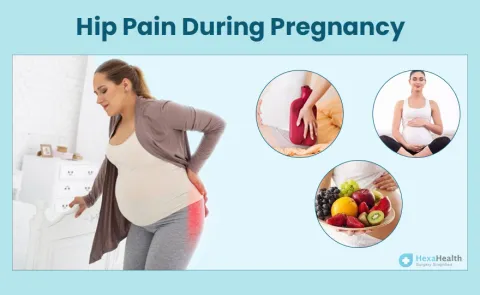Anaemia in Pregnancy - Causes, Complications and Treatment

Quick Summary
- Iron deficiency is the primary cause of anaemia in pregnancy.
- Anaemia during pregnancy can lead to premature delivery, low birth weight (LBW), mother and child death rates, and intrauterine growth retardation.
- Pregnant women should consume foods that are rich in iron, such as meat, poultry, fish, eggs, beans, lentils, and dark green leafy vegetables.
Iron deficiencies are the primary contributors to anaemia in pregnancy. [1] According to the National Family Health Survey (NFHS) of 2022, anaemia affects 52.2% of pregnant women in India. Pregnancy is probably one of the most memorable and emotional phases in a woman's life. However, when it comes to how her body changes throughout pregnancy, there are several things to consider. The higher need for iron to the growing baby is one such shift.
One of the contributing factors to a number of maternal and foetal issues is anaemia during pregnancy. It lessens the woman's ability to cope with bleeding during or after delivery and makes her more susceptible to infections. Premature delivery, low birth weight (LBW), mother and child death rates, and intrauterine growth retardation have all been correlated to anaemia during pregnancy.
Read on to learn everything about iron intake, iron deficiency, foods to help maintain healthy iron levels and how to treat anaemia in pregnancy.What is Anaemia in Pregnancy?
Anaemia in pregnancy is a condition characterised by a low level of haemoglobin or red blood cells in the blood during pregnancy which lowers the oxygen level in the body.
Many organs and bodily mechanisms are impacted when the cells do not receive enough oxygen. Due to the additional blood that the body produces to help the growing baby (the nutrition it needs), pregnant women are more likely to suffer anaemia.
Anaemia has over 400 types. Pregnancy makes some of them more prevalent, including:
- Iron-deficiency anaemia (due to low iron): This is the most common form of anaemia during pregnancy. Between 15% and 25% of pregnant women are iron deficient.Red blood cells contain the element iron, which helps in the storage and use of oxygen by the muscles and the transport of oxygen from the lungs to the body. With low iron in the body, the woman may experience fatigue and lowered infection defence.
- Folate-deficiency anaemia (due to lack of folic acid): Folate or folic acid is a water-soluble vitamin that helps prevent neural tube defects in growing babies.Pregnant women frequently take folic acid supplements, which are also present in fortified foods like cereals, leafy veggies, bananas, legumes, and melons. Due to the lack of folic acid in the food, the body produces fewer red blood cells, resulting in a deficiency.
- Vitamin B12 deficiency anaemia (caused by a lack of vitamin B12): The body needs vitamin B-12 to help synthesise red blood cells.Even though some women get enough B-12 in their diets, it's possible that their inability to properly absorb the vitamin results in a deficiency.
Classification of Anaemia in Pregnancy
The blood volume increases by 20% to 30% during pregnancy. Thus, to meet the iron needs, the body produces more red blood cells. Hence mild anaemia is normal in pregnancy.
However, to differentiate the severity, prevent complications, and treat anaemia in pregnancy, it has been classified.
| Grade | Hb levels |
| Mild anaemia | 9 to 10.9g/dL |
| Moderate anaemia | 7 to 8.9g/dL |
| Severe anaemia | less than 7g/dL |


Symptoms of Anaemia in Pregnancy
Symptoms of anaemia during pregnancy can initially be mild and often go undiagnosed. However, with the progressing pregnancy, the symptoms can get worse.
A doctor visit is essential since some symptoms may not be caused by anaemia alone but rather by other underlying conditions. If a woman is pregnant and experiencing the following symptoms, she could be anaemic.
- Pale skin, lips, hands, nails, or underside of the eyelid
- Easy fatigue
- Rapid heartbeat
- Dizziness
- Breathlessness
- Concentration difficulty
- Weakness and easy fatigue
- Headache
- Unintended movement in the lower leg
- Sore tongue
Causes of Anaemia during Pregnancy
Anaemia during pregnancy is a common condition affecting women worldwide. It is estimated that up to 50% of pregnant women suffer from anaemia.
It is important to understand the causes of anaemia during pregnancy to prevent and manage the condition effectively, ensuring a healthy pregnancy and birth outcome for both mother and baby. Some of the causes of anaemia during pregnancy include.
- Being vegan could be the prime cause of anaemia.
- Had a past history of anaemia, pregnancy could add to iron deficiency.
- Heavy menstrual flow before pregnancy is the culprit in rare cases.
- Multiple pregnancies where there is more need is another factor.
- If the mother’s age is less than 20, she is at increased risk of developing anaemia.
- Getting pregnant within a year of giving birth to a baby can put the woman at risk of iron deficiency.
- Iron deficiency anaemia during pregnancy develops when the body doesn't have enough iron from diet or prenatal vitamins.
- Severe morning sickness with excess vomiting can contribute to anaemia in pregnancy.
- Intestinal ulcers, Crohn's disease, or ulcerative colitis leading to internal bleeding can cause anaemia in some expectant moms.
- Not consuming enough iron, folic acid, or vitamin B-12 in the diet or prenatal supplements.
- Conditions like sickle cell anaemia and thalassemia can add to anaemia during pregnancy.
- Donating blood before pregnancy or during pregnancy can be an additional cause of anaemia.
Complications of Anaemia in Expecting Mothers
Anaemia in pregnancy can affect the baby's growth and risk the mother's health during and after labour. The baby could be born too early or preterm (when delivery occurs before 37 weeks of pregnancy) or have a low birth weight if the woman has anaemia during pregnancy.
Having a lot of exhaustion may also prevent the pregnant woman from recovering after childbirth.
Low birth weight and postpartum depression are also linked to iron deficiency anaemia during pregnancy. Also, some studies indicate a higher risk of newborn death right after birth due to anaemia.
Some other complications of anaemia in pregnancy due to severe or untreated iron deficiency anaemia are:
- Placental abruption
- Stillbirth
- Developmental delay in the baby
- Low birthweight
- Significant amount of blood loss during delivery
- Increased risk of infection due to anaemia
Treatment for Anaemia in Pregnancy
Anaemia is typically diagnosed through a blood test that measures the haemoglobin level. The World Health Organization defines anaemia in pregnancy as a haemoglobin level below 11 g/dL in the first and third trimesters and below 10.5 g/dL in the second trimester.
Treatment of anaemia in pregnancy varies depending on the pregnant woman’s age, general health, symptoms and on how serious the problem is.
- Iron supplementation: The most common cause of anaemia during pregnancy is iron deficiency. Therefore, iron supplementation is the first-line treatment for anaemia in pregnant women.
The American College of Obstetricians and Gynecologists (ACOG) recommends a daily iron supplement of 30 mg to 60 mg for pregnant women with anaemia. Women who cannot tolerate oral iron supplements may need intravenous iron therapy. - Folate and vitamin B12 supplementation: Folate and vitamin B12 are also important for the production of red blood cells. Pregnant women with anaemia may benefit from supplementation with these vitamins, particularly if they have a deficiency.
- Blood transfusion: In severe cases of anaemia, a blood transfusion may be necessary to quickly increase the haemoglobin level and improve oxygen delivery to the foetus.
However, blood transfusions carry risks and are only used when other treatments are ineffective or when the mother's life is in danger.
Prevention of Anaemia in Pregnancy
Anaemia is a common condition during pregnancy, but it can be prevented with the right strategies. Here are some details for the prevention of anaemia during pregnancy:
- Iron-rich diet: Eating a diet that is rich in iron is one of the best ways to prevent anaemia during pregnancy. Iron-rich foods include red meat, poultry, fish, beans, lentils, tofu, fortified cereals, and dark leafy greens.Pairing these foods with vitamin C-rich foods, such as citrus fruits and tomatoes, can enhance the absorption of iron.
- Regular check-ups: Regular prenatal check-ups can help to identify and monitor anaemia during pregnancy. A healthcare provider can perform blood tests to measure the haemoglobin level and recommend appropriate treatment if necessary.
- Treat underlying conditions: Anaemia during pregnancy can be caused by underlying conditions, such as bleeding disorders or infections. Treating these conditions promptly can help to prevent anaemia.
- Manage morning sickness: Severe morning sickness can lead to dehydration and a loss of nutrients, including iron. Managing morning sickness through small, frequent meals and staying hydrated can help to prevent anaemia.
- Avoid tea and coffee with meals: Tea and coffee contain compounds that can interfere with iron absorption. Drinking tea or coffee with meals can reduce the absorption of iron from food.
- Know your risk factors: Some women are at a higher risk of developing anaemia during pregnancy, including those with a history of anaemia, multiple pregnancies, or a diet that is low in iron. Knowing your risk factors can help you to take proactive steps to prevent anaemia.
Sources of Iron
| Plant sources of iron | Animal sources of iron |
| Legumes like beans, lentils and peas | Beef |
| Nuts like almonds, cashews, and pistachios | Chicken |
| Leafy greens like spinach, kale, collard | Eggs |
| Pumpkin seeds, sesame seeds, flax seeds | Clam |
| Broccoli, string beans, Brussel sprouts | Turkey |
| Whole grains like cornmeal, oats, bran, cornmeal | Ham |
| Tomatoes, potatoes, cabbage | Sardines and tuna |
| Fruits like prunes, orange, kiwi, grapefruit, lemon | Oysters |
| Dried fruits like dates, figs, raisins | Shrimps and Scallops |
When to Consult a Doctor?
Normally during antenatal screening in pregnant women, haemoglobin is checked to prevent and treat anaemia. Consult the doctor if a pregnant woman notice any of these symptoms:
- Dizziness
- Severe headache
- Rapid pulse rate
- Pale skin, lips
- Soreness in the tongue
- Restlessness in the limbs
If a pregnant woman is concerned about these symptoms, talk to the doctor about getting tested for anaemia and finding out how to keep the red blood cell count in check throughout the pregnancy.
Takeaway
Pregnancy comes with several physical, mental, and emotional changes. Anaemia in pregnancy is one of the most common conditions seen in expecting moms. Anaemia can be treated and prevented by eating a diet high in iron, folate, and vitamin C. Furthermore, daily prenatal vitamin use can help overcome the deficiency. Discuss your risk of anaemia during pregnancy with your healthcare provider and any worries you may have.
If you have any questions related to anaemia in pregnancy, causes of anaemia in pregnancy, or any other queries, feel free to contact HexaHealth. Contact the HexaHealth personal care team if you or a loved one is suffering from pregnancy-related anaemia. Our professionals will advise you and answer all your questions about anaemia in pregnancy. For more information on facilities available at HexaHealth, visit our website.
Frequently Asked Questions
Is anaemia in pregnancy common?
Yes. Anaemia is common in pregnancy. There are two significant causes of anaemia in pregnancy.
- As pregnancy progresses, your blood volume increases to help your growing baby. Thus blood plasma increases, but Hb doesn't increase, causing anaemia.
- Up to 52% of pregnant women across the globe don't obtain enough iron during pregnancy, which is a common cause of iron deficiency anaemia.
Is it normal to be anaemic during pregnancy?
Yes. Mild anaemia is common during pregnancy as the blood volume increases due to a diet deficient in iron. Your body needs a more supply of iron and vitamins to make RBCs and haemoglobin.
Your body won't produce enough haemoglobin to transport oxygen to your organs without iron and vitamins effectively. That’s why you frequently develop anaemia during pregnancy because you don't get enough iron and other micronutrients.
What is anaemia in pregnancy definition?
The definition of anaemia slightly varies in different countries and in different medical schools. However, the definition given by the World Health Organization (WHO) is widely accepted.
According to the WHO, anaemia in pregnancy definition is having a haemoglobin (Hb) concentration of less than 11 g/dl during pregnancy.
What should be the normal haemoglobin level during pregnancy?
What is the average Hb level in 8 months of pregnancy?
What are the types of anaemia affecting pregnant women?
Anaemia has over 400 types. Three common types of anaemia affecting pregnant women are
- Iron deficiency anaemia
- Folate deficiency anaemia
- Vitamin B12 deficiency anaemia
In which trimester is iron most important?
Is there any role of folic acid in pregnancy?
More than 70% of birth defects of the brain and spinal cord can be prevented with folic acid. In neural tube defects (NTDs), the spinal cord doesn't completely close.
Spina bifida is another prevalent malformation of the neural tube in which a portion of the baby's spinal cord remains outside of the body. The infant could get leg paralysis and eventually experience issues with bladder and bowel control.
Anencephaly is the most severe neural tube defect. The infant finally dies since it was born without part of its skull and brain. Also, several types of cancer and heart defects in the baby can be prevented if you take folic acid.
What is anaemia in pregnancy, as per Hb level?
The classification of anaemia in pregnancy given by the World Health Organization (WHO) is considered a standard parameter. WHO classifies pregnant women as anaemic if their haemoglobin is/are:
- Less than 11.0 g/dl in the first and third trimesters
- Less than 10.5 g/dl in the second trimester.
How is anaemia diagnosed in pregnancy?
Anaemia can be diagnosed via a blood test called a complete blood count (CBC), during initial prenatal sessions.
The CBC is evaluated by your doctor to determine:
- Your red blood cell count, together with their size and shape
- Your body's ability to store iron.
- Your vitamin B12 and B9 levels
What are the causes of anaemia in pregnancy?
What are the risk factors for anaemia during pregnancy?
Following are the risk factors for anaemia during pregnancy
- Multiple pregnancies
- Iron and folic acid deficiency
- Less duration between two pregnancies
- Heavy menstruation before pregnancy
- Severe vomiting
What are the signs & symptoms of anaemia in pregnancy?
Here are the most common symptoms of anaemia in pregnancy
- Pale skin and lips
- Feeling tired
- Breathlessness
- Dizziness
- Headache
- Weakness
How is anaemia during pregnancy diagnosed?
During your prenatal visits, your healthcare professional will check for anaemia. Often, it is detected via a routine blood test. Additional blood tests to detect anaemia are:
- Haemoglobin: This component of the blood transports oxygen from the lungs to the body's tissues.
- Haematocrit: This calculates the percentage of red blood cells present in a specific volume of blood.
What is considered severe anaemia in pregnancy?
How to prevent anaemia in pregnancy?
Want to know how to prevent anaemia in pregnancy? The following tips could be of help Iron deficiency anaemia during pregnancy can be prevented by eating a healthy diet. Lean red meat, chicken, and fish are dietary sources of iron. Dried beans and peas, dark green leafy vegetables, and breakfast cereals enriched with iron are additional alternatives.
What can be the complications of anaemia in pregnancy?
There are several complications of anaemia in pregnancy. The most common ones are:
- Placental abruption
- Stillbirth
- Delayed mental growth
- Pre-term birth
- Low birth weight
- Delayed postpartum recovery
- Post-partum depression
- A blood transfusion due to a significant amount of blood loss during delivery
- Increased risk of infection due to anaemia
Can anaemia during pregnancy cause miscarriage?
What are the natural remedies to treat anaemia during pregnancy?
Natural remedies for anaemia in pregnancy include an iron-rich diet. For instance, poultry, pork, red meat, seafood, beans, veggies with dark-green leaves, like spinach, and dried fruit, including apricots, raisins, cereals, breads, pasta and peas.
However, prenatal supplements are essential along with home remedies, to manage anaemia in pregnancy.
How can I treat anaemia at home while pregnant?
What should be the diet and lifestyle to treat anaemia in pregnancy?
Most women get all the iron they need by eating a healthy, balanced diet. Eating healthily can help you avoid anaemia or manage its symptoms if you already have it. Iron content varies among different foods. For instance, foods based on animals are very high in iron and are best absorbed.
Good sources of iron include meat like red meat such as beef, lamb and pork, pulses, fresh green leafy vegetables like cabbage, spinach, watercress, parsley, spring onions, seeds, dried prunes, almonds, brazil nuts, hazelnuts, raisins, figs, apricots, and fish such as tuna.
How to treat anaemia in pregnancy?
Depending on the severity, anaemia during pregnancy may need treatment. A daily prenatal vitamin or iron supplement is prescribed by your healthcare professional for mild to moderate anaemia.
This provides your body with adequate amounts of folic acid, iron, and vitamin B12. In case of severe anaemia a blood transfusion might be necessary.
What medication is given for anaemia in pregnancy?
Which iron is given in pregnancy?
Is anaemia serious in pregnancy?
Pregnancy anaemia puts the mother's health at danger both during labour and postpartum. In addition, it affects the growth of the unborn child too. If you have anaemia in pregnancy, your baby could be preterm before 37 full weeks of pregnancy which puts the baby's life in danger. Exhaustion might also impede your ability to recover from childbirth.
Iron deficiency anaemia during pregnancy is also associated with low birth weight and postpartum depression. Also, according to some research, anaemia may increase the likelihood of a new-born failure to thrive and survive after birth.
How much Hb is required for normal delivery?
Normal delivery doesn't solely depend upon the level of Hb. Although, iron deficiency anaemia is associated with increased risk of C-section.
Pregnant women with haemoglobin levels (>10 g/dl) give birth to normal (3.3 kg) or heavier babies.
Is normal delivery possible with anaemia?
How does iron deficiency anaemia during pregnancy affect the baby?
Iron deficiency anaemia increases the risk of preterm delivery. In addition, anaemia can cause:
- Low birth weight
- Stillbirth
- Premature baby
- Early placental separation
- Baby born with iron deficiency
- Delayed mental and intellectual development
Can anaemia cause foetal death?
Iron deficiency anaemia during pregnancy has a negative impact on the health of the mother and foetus. It is also associated with poor maternal and foetal health and a higher death rate in the baby.
Intrauterine growth retardation, preterm, and low birth weight are examples of adverse perinatal outcomes that all have high death risks, especially in underdeveloped countries.
What does untreated anaemia do to the body?
Untreated iron deficiency anaemia can have serious complications. These include fatigue, headaches, restless legs syndrome, heart issues, problems during pregnancy and delays in a child's development.
Moreover, iron deficiency anaemia might worsen other chronic illnesses or make their treatments less effective.
How soon after treatment for anaemia during pregnancy will I notice a change?
When should I worry about anaemia during pregnancy?
Due to an increase in blood volume during pregnancy, mild anaemia is common. However, there is a risk of premature delivery, low birth weight and need for blood transfusion if the anaemia is more severe.
If your symptoms are getting worse or in spite of medications your symptoms don't reduce talk to your health care provider.
Last Updated on: 12 July 2024
Reviewer

A specialist in Obstetrics and Gynaecology with a rich experience of over 21 years is currently working in HealthFort Clinic. She has expertise in Hymenoplasty, Vaginoplasty, Vaginal Tightening, Labiaplasty, MTP (Medical Termination...View More
Author
HexaHealth Care Team
HexaHealth Care Team brings you medical content covering many important conditions, procedures falling under different medical specialities. The content published is thoroughly reviewed by our panel of qualified doctors for its accuracy and relevance.
Expert Doctors (10)
NABH Accredited Hospitals (5)
Latest Health Articles

























 Open In App
Open In App